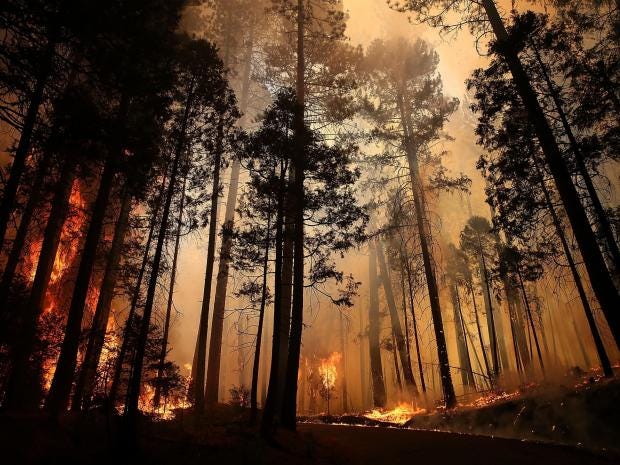http://www.independent.co.uk/environment/forests-wildfires-climate-change-california-australia-not-recover-global-warming-regeneration-a8122501.html
Forests destroyed in wildfires not recovering due to climate change, scientists reveal
Study suggests higher temperatures in the Rocky Mountains are preventing trees from growing back following wildfires
- Josh Gabbatiss Science Correspondent
- 18 comments
|
|
|
| 630 |
Click to follow
The Independent Online
The Independent Online

A new study suggests hotter climates resulting from global warming may prevent forests from regenerating after wildfires.
Recent wildfires in California were the most destructive on record, with governor Jerry Brown warning climate change could make such fierce events "the new normal".
In hot, dry climates like those found in the western US, wildfires are often a natural part of the environment, contributing to the cycling of nutrients and growth of new plants.
However, a new study published in the journal Ecology Letterssuggests increasing global temperatures may be preventing this natural cycling from taking place.
California fires: in pictures
The result could be long-term damage to areas of forest destroyed by wildfires.
Led by Dr Camille Stevens‐Rumann, an ecologist at Colorado State University, the study involved testing fire-struck areas of forest for signs of regeneration.
The scientists examined 1485 sites in the Rocky Mountains, all of which had been affected by fires between 1985 and 2015.
They looked for seedlings growing in the examined sites, comparing growth with nearby unburned forests to determine how well forests in each area were able to regenerate.
The team found the proportion of sites in which no post-fire tree regrowth had taken place increased from 19 to 32 per cent when comparing earlier years of the analysis to the more recent years.
“Significantly less tree regeneration is occurring after wildfires in the start of the 21st century compared to the end of the 20th century,” the scientists wrote in their paper.
Comparing these findings with information on the region’s changing climate suggested increases in global temperatures were influencing forest regeneration, particularly in the driest regions.
“Dry forests that already occur at the edge of their climatic tolerance are most prone to conversion to non-forests after wildfires,” the scientists wrote.
READ MORE
Natural disasters are increasingly being linkedto climate change, and according to Todd Gartner, a senior associate at environmental think tank World Resources Institute, climate change is a “contributing factor” to the recent events in California.
Scientists have linked changes in temperature, levels of rain and soil moisture - all of which are influenced by global warming - to increased risk of wildfires.
This new study suggests the impact of climate change on wildfires may have longer term consequences as well.
“As scientists, managers and the public aim to understand and plan for increasing fire activity, our results suggest a high likelihood that future wildfires will facilitate shifts to lower density forest or non-forested states under a warming climate,” the scientists concluded.




沒有留言:
張貼留言